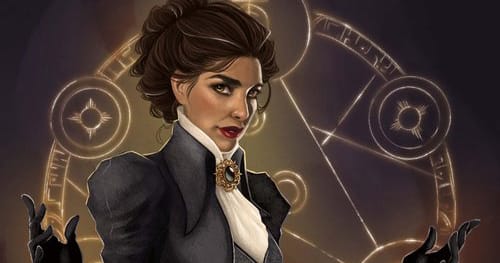An Elderly Lady Is Up to No Good, Part 1

It’s an opinion so widely shared that the degree of consensus practically elevates it to the status of fact: Curse of Strahd is the best campaign-length adventure for fifth edition Dungeons & Dragons published by Wizards of the Coast. And out of all the games I’ve run since I began playing 5E in 2015, it prompted the creation of the best player character: my wife’s Undying warlock, Ava Sarala (yes, the reference is intentional).
There’s some irony here, because the Undying patron is the subject of another consensus opinion: that it’s the worst warlock subclass in 5E. T.E. Kamstra of RPGbot calls it “situational and reactionary [sic],” “underwhelming” and “laughably weak.” Flutes Loot scores it 2/5, calling it “notoriously bad” and rating it high for lore and roleplaying but rock-bottom for design and accessibility and for functionality at high levels. Tabletop Joab asks, “Is the undying warlock good?” and replies, “To be blunt: no.” It goes on to say, “The Undying warlock is entirely lackluster in everything but its theme,” and to call it “so niche that I can’t think of a situation where I would recommend it.” It suffered the ignominy of being memory-holed by WotC and superseded by the similarly named but differently themed Undead patron of Van Richten’s Guide to Ravenloft.
So what makes Ava such a good character, despite Jen’s choice of what’s widely considered a mechanically subpar subclass? Because of the depth she went into when bringing Ava to life, and the way that depth informed her subsequent development of the character.
I’ll let her tell the story:
So I’d previously played a low-Charisma Beast Master ranger, and had decided at the end of that campaign that I wanted my next character to have a higher Charisma score, maybe be Charisma-based, and I’d also been thinking about how I was interested in stories with characters who were older and going on adventures. I didn’t really want to play another character who was very young, and this was their first rodeo. But that raised some interesting questions: If I was playing an older character, an older woman, why was this going to be her first adventure? … I remember zeroing in on the idea of a magic-user who was an older noblewoman, someone who was very well-read, and somehow that knowledge led to using magic. And that led me to the warlock class, which also gave a good explanation for why she was going to be level 1. She’d been this noblewoman, and lived this life of comfort, and had come to this point where she started to pursue arcane power. …
She obviously needed a high Charisma. She needed to be smart. If she’s going to be an older character, she’s probably accumulated some Wisdom … and then she needed to have some Dexterity just so that she could hold her own in combat, have a little bit of defensive capability. Strength ended up being her dump stat, as much as she had one. She didn’t have a particularly high score in any of them. She had a 16 Charisma, with the +1 from being a human, and then a 12 in Wisdom, a 14 in Intelligence. … So she was human, and she was older. Then it’s like, well, why is she pursuing magic? Why is she looking into these arcane things? And that brought me around to the idea … that she wanted to get back her youth. And why did she want to do that? And [I] went from there.
I looked at the other patrons. I remember the Great Old One worked with the idea of her being this bookish character, because I wanted her to be well-read and well-educated, but ultimately it didn’t really vibe with the rest of the idea I had of that character … someone who would have patience, who would be able to make better decisions, who might be playing a long game, and the idea of incorporating madness into that character didn’t really match up. I guess the Fiend would have been OK, but that’s where the Undying came from: the pursuit of eternal youth.
Normally, I don’t allow evil PCs in D&D campaigns. For Curse of Strahd, I made an exception: As long as they cleared it with me first, players could play lawful evil or neutral evil characters if they chose. After some discussion, Jen and I decided that it made the most sense for Ava to be lawful evil, but it wasn’t a foregone conclusion.
I wasn’t initially envisioning this character as being evil. I was more interested in the idea of her being older and having these plans in life outside of being a first-time adventurer, and so I didn’t like the idea of attaching her to, like, a lich. Who would do that? That doesn’t match up with the other ideas that I had about that character. … I decided that her pact was going to be Pact of the Tome, I’d already decided that, and that led to me having the idea, “What if the Tome is the patron? What if the patron is a sentient book?”
Thus, instead of Vecna or Vlaakith, Ava’s patron was the Kitab-e bi-Senn (“Book of the Ageless”), which she had to read from as part of every long rest, and which revealed a chapter’s worth of new secrets to her with each level she gained.
I chose to kick off Curse of Strahd with the “Werewolves in the Mist” hook. Our party’s monk belonged to the Emerald Enclave. Our two bards were Harpers. Ava and the party’s ranger were affiliated with the Lord’s Alliance—and despite Ava’s alignment, Jen had not only the ranger but the entire party following her lead in nothing flat.
What gave her such soft power?
The essence of her backstory is that she was born a noble, she grew up for a certain amount of time believing that she was going to inherit this title and estate, land rights, that she was going to become the head of this family, and then she later, as an older child–slash–young adult, she had a younger brother, and she got shoved to the side. They wanted her to take one for the team, maybe marry someone with money or power and let her brother be the heir, and she was just not interested in that. She had already defined herself as the person who was going to be in charge, and she wasn’t interested in bearing children and marrying some a⸻ for money and whatever. She was—let’s say, disagreeable, not very malleable as a young adult. She got involved with her family’s business endeavors and behaved very independently for a long time, carried on some love affairs that were probably ill-advised, ended up in a long-term relationship with an elven mage who was not of particularly good repute. I imagined him as being, I don’t know, someone who was not particularly serious. But she was having fun, and then her parents died, and she got basically written out of the family will. She wasn’t left anything, because she hadn’t followed their goals for her. Her brother shouldered her out of the business. She ended up being left by her elf boyfriend. She didn’t have any money anymore. She didn’t have those societal connections as much. She was on the outs, and she wasn’t very happy about it. So she left the city she was from, which in our game was Waterdeep, and moved to another city and managed to rebuild a life for herself, where she accumulated money and made connections, but I imagine they were seedier. Maybe she was trading illicit magic items, dabbling in the less reputable parts of town but still maintaining a good face. And then she got wind of this magic book and burned all of her resources at that point to get her hands on it.
She’d lived a comfortable life, but she was not happy and not satisfied, and when she was in this relationship with the mage, she had started to become interested in magic, and that’s how she got into collecting, trading, buying, selling magic items … and she had this line on a magic book that could maybe restore youth, and that’s what she really wanted. She wanted her youth restored. She wanted to depose her brother and take back her estate. She wanted to be on top of the world, so she burned everything she had to get this book, and that’s where her story started in the game. She now had this book, she made a deal with the sentience inside the book … and she got to it. It gave her back her youthfulness, and she set out to pursue money and power and prestige and did a great job doing those things. Two thumbs up.
She is very self-interested, very independent. She is very interested in pursuing power. She sees money as being a tool to gain power, but it’s not as important to her as other things. She sees knowledge as being very important for gaining power. So for her having power means being independent, being able to do what she wants, freedom. She appreciates the finer things in life. She likes beautiful things. She likes to have control. But an important part of her personality is having a long-term mind-set. … She can be patient. She doesn’t act impulsively. She can outwait someone. And she doesn’t mind letting someone else think they’re in control as long as she actually has control. She’s very manipulative. She likes people to go along with her willingly rather than trying to use brute force to make them do something. … She wants them to believe that it is in their best interest to do what she wants them to do. I think she is at her core a little bit of a trickster, in that she lies—by the end of the campaign her modifier for Deception was something f⸻ bananas, like +16 or something. So she’s very good at lying, manipulating—and persuading. Persuading people to go along with what she wants them to do, that it’s in their own best interests. That she is the best one to carry the money, she’s the most responsible one, that they should just let her take care of it. They don’t have to worry about it. She’s got this.
At the start of Curse of Strahd, Ava is in her 60s—but thanks to the Kitab, she looks like a woman in her late 30s, in the prime of her power, vigorous and authoritative. She doesn’t keep the book hidden, but she doesn’t talk about it, either, and no one ever asks her about it. It’s a magic book; she studies it. What more is there to know? She treats every aspect of herself, including her dominance, with nonchalance. As a result, so does everyone else.
She rules.
Unfortunately, she couldn’t be who she is if she were created in 5E24.

